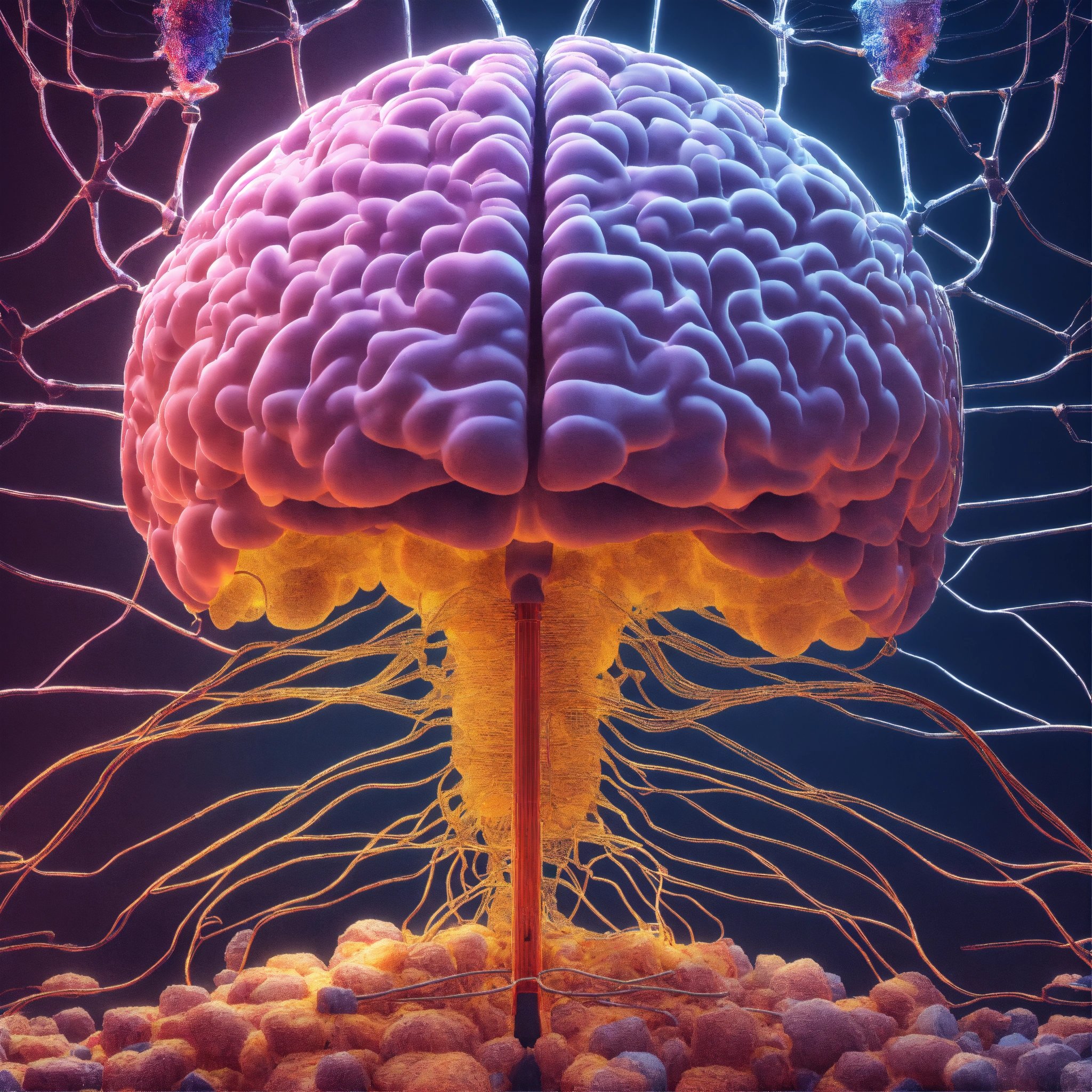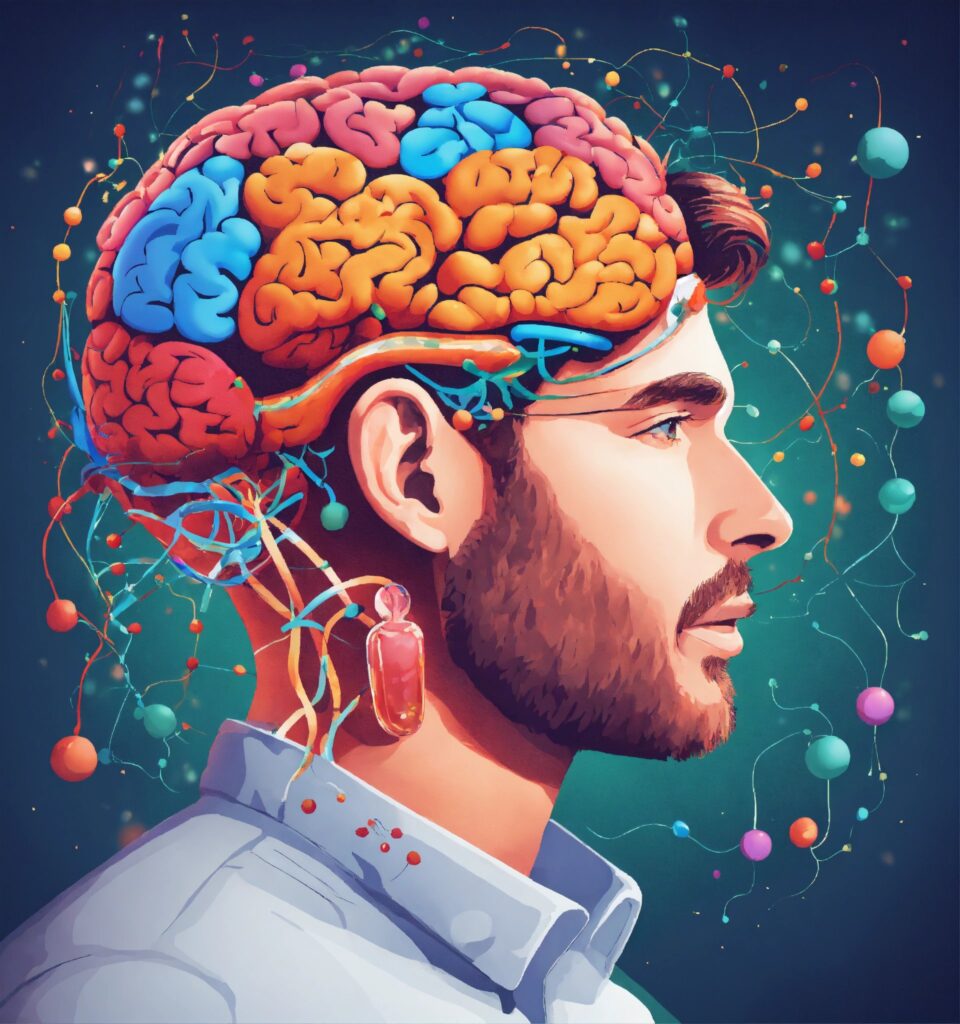Great Health Great Fitness
“Mastering Brain Health: Understanding Neurological Disorders and Nurturing Cognitive Well-being”
Embark on a journey to master brain health by delving into the intricate world of neurological disorders. Gain insights into the complexities of the brain and discover strategies to nurture cognitive well-being. Join us as we explore the intersection of neuroscience and mental wellness, empowering you to take charge of your brain health and optimize cognitive function for a fulfilling life.

Introduction
In the vast landscape of human health, few aspects are as intricate and essential as brain health. The brain serves as the command center for the body, regulating everything from movement and sensation to thoughts and emotions. However, this complex organ is also susceptible to various disorders and conditions that can significantly impact cognitive function and overall well-being. In this comprehensive exploration, we delve into the intricacies of brain health, examining the nature of neurological disorders and strategies for nurturing cognitive well-being.
In the intricate tapestry of human health, few aspects hold as much significance and complexity as brain health. The brain, often referred to as the body’s command center, orchestrates an astonishing array of functions, from regulating vital bodily processes to facilitating complex thoughts and emotions. However, this remarkable organ is not invulnerable; it is susceptible to a myriad of disorders and conditions that can profoundly impact cognitive function and overall well-being.
In this exploration, we embark on a journey to understand the intricate workings of the brain, the nature of neurological disorders, and the strategies for nurturing cognitive well-being. As we navigate this terrain, we uncover the challenges and opportunities inherent in mastering brain health and delve into the profound implications for individuals, families, and communities worldwide.
Join us as we embark on a quest to unlock the mysteries of the brain, empower individuals to navigate neurological disorders with resilience and grace, and foster a world where cognitive well-being thrives.
Understanding Neurological Disorders: Exploring the Brain’s Complexities for Improved Health

Neurological disorders represent a diverse array of conditions that affect the brain, spinal cord, and peripheral nerves, disrupting normal neurological function and often resulting in debilitating symptoms. From disorders that impair movement and coordination to those that affect cognitive function and mental health, the impact of neurological disorders on individuals and society is profound.
Types of Neurological Disorders
Neurological disorders encompass a broad spectrum of conditions, each with its own distinct characteristics, causes, and manifestations. Some of the most common types of neurological disorders include:
- Alzheimer’s Disease and Other Dementias: Alzheimer’s disease is a progressive neurodegenerative disorder characterized by memory loss, cognitive decline, and changes in behavior and personality. Other types of dementia, such as vascular dementia and Lewy body dementia, share similar symptoms and can also significantly impact quality of life.
- Parkinson’s Disease: Parkinson’s disease is a movement disorder characterized by tremors, stiffness, bradykinesia (slowed movement), and postural instability. It results from the degeneration of dopamine-producing neurons in the brain and can lead to significant motor and non-motor symptoms.
- Multiple Sclerosis (MS): Multiple sclerosis is an autoimmune disorder in which the body’s immune system attacks the myelin sheath, the protective covering of nerve fibers in the central nervous system. This results in inflammation, scarring, and disruptions in nerve signaling, leading to a wide range of symptoms, including fatigue, weakness, numbness, and difficulties with vision and coordination.
- Epilepsy: Epilepsy is a neurological disorder characterized by recurrent seizures, which result from abnormal electrical activity in the brain. Seizures can manifest in various forms, from brief lapses in consciousness to convulsions and involuntary movements, and can significantly impact daily functioning and quality of life.
- Stroke: Stroke occurs when blood flow to a part of the brain is interrupted or reduced, depriving brain cells of oxygen and nutrients. This can result in rapid loss of brain function and lead to symptoms such as paralysis, speech difficulties, and cognitive impairments. Stroke is a medical emergency that requires prompt intervention to minimize brain damage and prevent long-term disabilities.
Causes and Risk Factors
The causes of neurological disorders are varied and multifactorial, often involving complex interactions between genetic, environmental, and lifestyle factors. Some neurological disorders, such as Alzheimer’s disease and Parkinson’s disease, have genetic predispositions, while others, such as stroke and traumatic brain injury, may result from environmental exposures or traumatic events.
Certain risk factors, such as advancing age, family history, and underlying medical conditions, may increase an individual’s susceptibility to neurological disorders. Lifestyle factors, including diet, exercise, sleep, and stress management, can also play a significant role in brain health and influence the risk of developing neurological disorders.
Impact on Individuals and Society
The impact of neurological disorders extends beyond the affected individuals, affecting their families, caregivers, and society as a whole. These disorders can result in profound physical, cognitive, and emotional impairments, often necessitating extensive medical care, rehabilitation, and support services.
Neurological disorders can also impose significant economic burdens, both directly through healthcare costs and indirectly through lost productivity and reduced quality of life. As the global population ages and the prevalence of neurological disorders increases, the societal impact of these conditions is expected to grow, underscoring the importance of research, education, and advocacy efforts aimed at improving prevention, diagnosis, and treatment.
Common Neurological Disorders

Neurological disorders encompass a wide range of conditions that affect the brain, spinal cord, and peripheral nerves. These disorders can vary in severity and impact, but they often share common symptoms and challenges. Understanding these conditions is crucial for early detection, accurate diagnosis, and effective management. Below are some of the most prevalent neurological disorders:
- Alzheimer’s Disease: Alzheimer’s disease is a progressive neurodegenerative disorder characterized by memory loss, cognitive decline, and changes in behavior and personality. It is the most common cause of dementia in older adults, affecting millions of people worldwide. As the disease progresses, individuals may experience difficulties with language, decision-making, and daily activities, leading to increased dependence on caregivers.
- Parkinson’s Disease: Parkinson’s disease is a chronic and progressive movement disorder that primarily affects motor function. It is characterized by tremors, stiffness, bradykinesia (slowed movement), and postural instability. Parkinson’s disease results from the degeneration of dopamine-producing neurons in the brain. While there is currently no cure for Parkinson’s disease, medications, lifestyle modifications, and surgical interventions can help manage symptoms and improve quality of life.
- Multiple Sclerosis (MS): Multiple sclerosis is an autoimmune disorder in which the body’s immune system mistakenly attacks the myelin sheath, the protective covering of nerve fibers in the central nervous system. This results in inflammation, scarring, and disruptions in nerve signaling, leading to a wide range of symptoms, including fatigue, weakness, numbness, difficulties with vision and coordination, and cognitive impairments. MS is a chronic condition with a variable course, and treatment aims to reduce relapses, manage symptoms, and slow disease progression.
- Epilepsy: Epilepsy is a neurological disorder characterized by recurrent seizures, which result from abnormal electrical activity in the brain. Seizures can manifest in various forms, from brief lapses in consciousness to convulsions and involuntary movements. Epilepsy can have significant implications for daily functioning, safety, and quality of life. While many people with epilepsy can achieve seizure control with medications, others may require additional treatment options, such as surgery, neurostimulation devices, or dietary therapy.
- Stroke: Stroke occurs when blood flow to a part of the brain is interrupted or reduced, depriving brain cells of oxygen and nutrients. This can result in rapid loss of brain function and lead to symptoms such as paralysis, speech difficulties, cognitive impairments, and sensory deficits. Stroke is a medical emergency that requires prompt intervention to minimize brain damage and prevent long-term disabilities. Treatment may include medications, thrombolytic therapy, mechanical thrombectomy, and rehabilitation services.
- Migraine Headaches: Migraine is a common neurological disorder characterized by recurrent headaches that can be severe and disabling. In addition to head pain, migraines may be accompanied by symptoms such as nausea, vomiting, sensitivity to light and sound, and visual disturbances known as aura. Migraine headaches can have a significant impact on daily activities, productivity, and quality of life. Management strategies may include lifestyle modifications, medications for acute relief and prevention, and complementary therapies.
- Traumatic Brain Injury (TBI): Traumatic brain injury occurs when an external force causes damage to the brain, resulting in physical, cognitive, and emotional impairments. TBIs can range from mild concussions to severe injuries with long-term consequences. Common causes of TBI include falls, motor vehicle accidents, sports injuries, and assaults. Treatment for TBI focuses on stabilizing the patient, preventing further injury, and addressing symptoms such as headaches, cognitive deficits, and mood disturbances.
Impact on Cognitive Well-being
Neurological disorders can have a profound impact on cognitive well-being, affecting various aspects of cognitive function, including memory, attention, language, executive function, and visuospatial abilities. The cognitive impairments associated with these disorders can significantly diminish quality of life, independence, and overall functioning. Understanding the impact of neurological disorders on cognitive well-being is essential for providing comprehensive care and support to affected individuals. Below are some of the ways in which neurological disorders can affect cognitive function and well-being:
- Memory Impairment: Many neurological disorders, such as Alzheimer’s disease, vascular dementia, and traumatic brain injury, are characterized by memory impairments. Individuals may experience difficulties with short-term memory, long-term memory, and memory retrieval, leading to forgetfulness, confusion, and disorientation. Memory impairments can have significant implications for daily functioning, social interactions, and safety.
- Attention and Concentration: Neurological disorders can affect attention and concentration, making it challenging for individuals to focus on tasks, sustain attention, and filter out distractions. This can impact productivity, academic performance, and the ability to engage in meaningful activities. Attention deficits are common in conditions such as attention-deficit/hyperactivity disorder (ADHD), traumatic brain injury, and certain neurodegenerative diseases.
- Language and Communication: Language and communication difficulties are common in many neurological disorders, including aphasia (language impairment) in stroke survivors, dysarthria (speech impairment) in individuals with Parkinson’s disease, and expressive and receptive language deficits in individuals with dementia. These impairments can hinder social interactions, limit participation in conversations, and lead to frustration and isolation.
- Executive Function: Executive function refers to a set of cognitive processes involved in planning, organization, problem-solving, decision-making, and self-regulation. Neurological disorders such as traumatic brain injury, stroke, and frontal lobe lesions can impair executive function, resulting in difficulties with goal-directed behavior, impulse control, and adaptive functioning. Executive dysfunction can impact various aspects of daily life, including work, relationships, and independent living.
- Visuospatial Skills: Visuospatial skills involve the ability to perceive, interpret, and navigate spatial information in the environment. Neurological disorders such as Alzheimer’s disease, Parkinson’s disease, and stroke can affect visuospatial abilities, leading to difficulties with visual perception, spatial orientation, and spatial awareness. Visuospatial impairments can impact activities such as driving, reading maps, and navigating unfamiliar environments.
- Mental Flexibility and Problem-Solving: Neurological disorders can impair mental flexibility and problem-solving skills, making it challenging for individuals to adapt to new situations, generate alternative solutions, and overcome obstacles. Cognitive inflexibility is common in conditions such as autism spectrum disorder, obsessive-compulsive disorder, and certain neurodevelopmental and neurodegenerative diseases.
Impact on Quality of Life
The cognitive impairments associated with neurological disorders can have far-reaching effects on individuals’ quality of life, independence, and overall well-being. These impairments can impact various domains of functioning, including work, education, relationships, leisure activities, and self-care. Cognitive deficits may lead to difficulties with instrumental activities of daily living (IADLs), such as managing finances, cooking meals, and using transportation, as well as basic activities of daily living (ADLs), such as bathing, dressing, and grooming.
Furthermore, cognitive impairments can contribute to emotional distress, frustration, anxiety, and depression, both for individuals with neurological disorders and their caregivers. Feelings of loss, grief, and identity changes may arise as individuals grapple with the cognitive changes brought about by their condition. Additionally, cognitive impairments can increase the risk of accidents, falls, and other safety concerns, necessitating modifications to the home environment and increased supervision and support.
Impact on Cognitive Well-being

The impact of neurological disorders on cognitive well-being cannot be overstated. These conditions can disrupt essential brain functions, leading to memory loss, impaired judgment, altered perception, and difficulty with language and communication. The consequences extend beyond the individual, affecting relationships, independence, and quality of life. Furthermore, neurological disorders often entail significant emotional and psychological burdens, both for patients and their caregivers, highlighting the need for comprehensive support and care.
Navigating Diagnosis and Treatment
Diagnosing neurological disorders can be challenging, requiring a combination of clinical assessment, medical imaging, and laboratory tests. Early detection is crucial for maximizing treatment efficacy and managing symptoms effectively. Treatment approaches vary depending on the specific disorder but may include medications, physical therapy, occupational therapy, speech therapy, and surgical interventions. In recent years, advances in medical technology and research have expanded treatment options, offering hope for improved outcomes and quality of life for individuals with neurological disorders.
Strategies for Nurturing Cognitive Well-being
While neurological disorders pose significant challenges, there are also opportunities for promoting cognitive well-being and enhancing brain health. Adopting a brain-healthy lifestyle can play a vital role in supporting cognitive function and reducing the risk of neurological decline. Key strategies include:
- Regular Exercise: Physical activity has been shown to have numerous benefits for brain health, including improving blood flow, reducing inflammation, and enhancing cognitive function. Aim for a combination of aerobic exercise, strength training, and flexibility exercises to support overall brain health.
- Healthy Diet: Nutrition plays a crucial role in brain health, with certain foods and nutrients exerting protective effects against cognitive decline. Emphasize a balanced diet rich in fruits, vegetables, whole grains, lean proteins, and healthy fats. Limit intake of processed foods, sugary snacks, and saturated fats, which can contribute to inflammation and oxidative stress.
- Mental Stimulation: Engaging in mentally stimulating activities, such as reading, puzzles, learning new skills, and socializing, can help maintain cognitive function and promote brain resilience. Keep your mind active and challenged to support neuroplasticity and cognitive flexibility.
- Adequate Sleep: Quality sleep is essential for brain health, allowing the brain to rest, repair, and consolidate memories. Aim for 7-9 hours of uninterrupted sleep per night and prioritize good sleep hygiene practices, such as establishing a consistent sleep schedule, creating a relaxing bedtime routine, and optimizing your sleep environment.
- Stress Management: Chronic stress can have detrimental effects on brain health, contributing to cognitive decline and increasing the risk of neurological disorders. Incorporate stress-reducing techniques into your daily routine, such as mindfulness meditation, deep breathing exercises, yoga, and spending time in nature.
- Social Connection: Maintaining social connections and fostering meaningful relationships can have profound benefits for brain health and overall well-being. Stay connected with friends, family, and community members, and seek out opportunities for social interaction and support.
- Brain-Healthy Habits: Avoiding harmful substances such as tobacco, excessive alcohol, and illicit drugs is essential for preserving brain health. These substances can damage brain cells, impair cognitive function, and increase the risk of neurological disorders.
Conclusion
In conclusion, mastering brain health is a multifaceted endeavor that requires understanding, resilience, and proactive care. Neurological disorders pose significant challenges, impacting cognitive function, independence, and quality of life for millions of individuals worldwide. However, by embracing brain-healthy lifestyle practices and fostering a supportive environment, we can nurture cognitive well-being and promote brain resilience. Through continued research, education, and advocacy, we can empower individuals, families, and communities to navigate the complexities of neurological disorders and unlock the full potential of brain health.
This comprehensive exploration offers insights into the complexities of neurological disorders and provides practical strategies for nurturing cognitive well-being. For More information you can check our blogs Unveiling the Threat: Emerging Infectious Diseases and Global Health Security.
